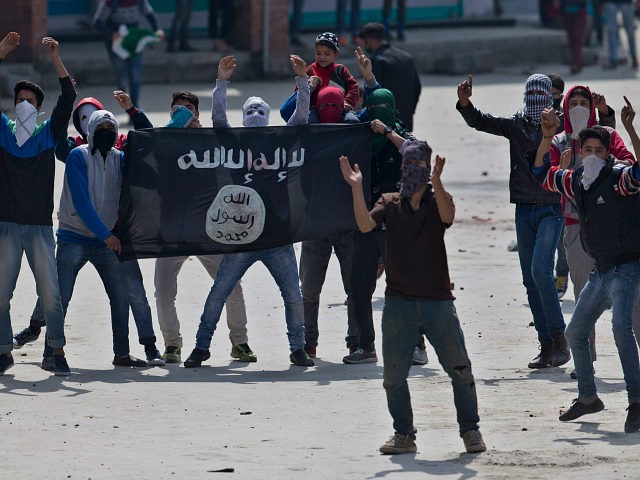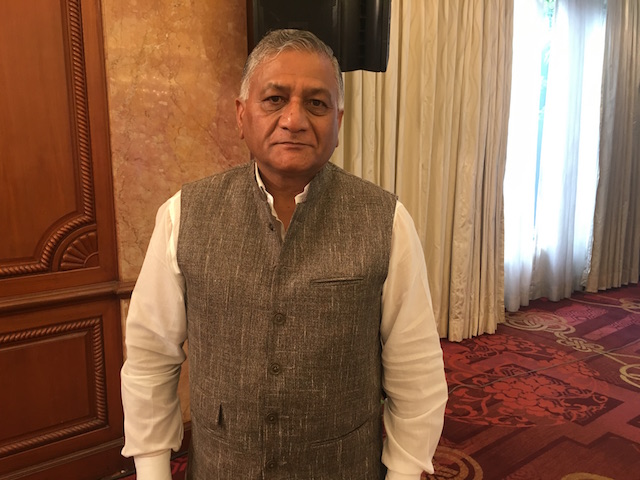NEW DELHI, India – Indian politicians believe the nation’s long history of religious integration has inoculated it from the Islamic State’s attempts to recruit more jihadi militants from the subcontinent.
In interviews with Breitbart News, they nonetheless expressed concern that neighboring Muslim-majority nations Pakistan and Bangladesh have long been hotbeds of jihadist recruitment, and fear that tolerance on the part of Pakistan’s government in particular for groups like the Taliban and violence in the disputed Kashmir region threaten the stability of the nation.
During the inaugural edition of the India-U.S. Forum, sponsored and hosted by the Indian government’s Ministry of External Affairs and the Ananta Centre at the Taj Mahal Hotel in New Delhi on Monday, Indian politician and Gardiner Professor of History at Harvard University Sugata Bose told Breitbart News, “So far, I think ISIS has not been able to make any significant inroads in India. We are talking about a handful of people who might have been recruited. And I think in South Asia as a whole the Islamic State will find it very difficult.”
Asked what he attributed this to, Bose said, “I think that we have a composite society. Hindus and Muslims and Sikhs and Christians are all equal citizens here. So they are all very well integrated.”
Pawan Khera, the spokesman for the Indian National Congress (INC), the opposition party to the BJP, told Breitbart News that he also does not “see any major movement towards any Islamic movement internally. India has integrated those communities very well.”
According to the Brookings Institution, India has confirmed that 142 of its citizens have joined the Islamic State. The publication noted that out of those 142 Indian citizens, 85 have been arrested or interrogated by India’s government and 11 have been killed: “six in Syria, three in Afghanistan, one in a police encounter in India, and one in either Iraq or Syria. This means at least 43 are active or at large, although many of these have been reported (but not confirmed) killed.”
In 2013, India detained one person linked to the Islamic State, and, one year later, the subcontinent detained six. In 2015, that figure rose to 35 individuals, and in 2016, 75 reported militants were arrested. In the first four months of 2017 alone, India arrested 25 Islamic State loyalists.
Among the most recent incidents of Islamic State crime in the country, Gujarat’s anti-terrorism squad reportedly arrested two brothers, Waseem and Naeem Ramodiya, suspected in February of being affiliated with the Islamic State. The Ramodiyas were reportedly planning to conduct a series of bombings in religious locations throughout the state.
The Indian Express reported that the National Investigation Agency (NIA) found that half of the Islamic State militants they arrested belonged to the Ahle Hadith group, 30 percent were of the Tablighi/Jammat ideology, and the rest were followers of the Deobandi school of Islamic thought.
The Indian government banned the Islamic State from the country in December 2014 under Manohar Parrikar, who was defense minister at the time. However, in May 2016, the Islamic State released a propaganda video in which an engineering student, Fahad Tanvir Sheikh, vowed to avenge violence against Muslims living in India and urged all Indian Muslims to join the movement to grow the Islamic caliphate in the subcontinent.
The move came nearly six months after the establishment of United Nations Security Council Resolution 2170, which officially condemned the terrorist group and called for member-states to take action against it.
Before India’s ban on the Islamic State in 2014, the terrorist group took 39 Indian hostages in Mosul, Iraq. All 39 were reportedly killed.
India feels its citizens are particularly difficult to recruit to the cause of jihad. However, it is surrounded by Muslim-majority nations in which multiple jihadi movements have made their homes.
Ever since Pakistan was formed in 1947, the country’s leadership has had its hand in the export of radical jihadi violence throughout the world. The South Asian Terrorism Patrol (SATP) lists at least 32 “trans-national” Pakistani terrorist groups and 11 “domestic organizations.”
Recruitment by the Islamic State from Bangladesh has also been a source of concern for India and the porous borders between both nations.
Last year, Dabiq featured an interview with Shayk Abu Ibrahim al-Hanif, the Islamic State’s “emir” to Bangladesh, where he said, “Bengal is an important region for the Khilafah and the global jihad due to its strategic geographic position.” Al-Hanif reportedly also praised several Bengali suicide bombers. “They saw that with the help of Allah, a small number of mujahidin with limited means are able to target and intimidate the various sects of kufr [infidels] in any part of the region despite all the false claims of supremacy attributed to the taghut [rebel] forces and designed to intimidate the believers.”
Gen. Vijay Kumar Singh (Retd), who served as the Indian government’s Minister of State for External Affairs, told Breitbart News he believes a strong U.S. stance against tolerance for jihadist groups in Pakistan could help diminish the threat. “The problem is, when the U.S. got involved post-2001 in Afghanistan because of various actions, it willy-nilly played into the hands of Pakistan. It did not look for options which were beyond what was being done. Pakistan made full use of this,” he said in an interview.
He noted that the type of aid Pakistan was receiving was being used for the purposes of “making its own people safe because a large number of them were working in Afghanistan as part of the Taliban. So this is something that the U.S, despite seeing it, was not able to get over it or find a solution to it in the years to come. And so you still have a problem. They needed to make a stop of it.”
Asked if he is optimistic that this will change under the Trump administration, he said, “Yes, I’m optimistic about anything that anybody wants to do.”
India has also focused on the state of Kerala – located on the southwestern tip of the subcontinent and has the Arabian Sea on the west, Karnataka to its north and northeast, Tamil Nadu to its east – as an Islamic State recruitment center. News surfaced about Keralans having joined the group and traveling to Iraq, Syria, and Afghanistan on the Islamic State’s behalf and returned to recruit others to the cause.
Kashmir, the disputed region between India and Pakistan, also remains a concern. In February, military and police officers in Kashmir said the Islamic State had arrived in the region. Graffiti and posters announcing the terrorist group’s arrival were found across the Solan district of the Indian state Himachal Pradesh, and posters announcing a coming “fatwa” and threats of “bomb blasts from Himachal Pradesh to Nepal using washing machines and television sets” were reportedly discovered.
The Islamic State declared in its online propaganda issue Dabiq last year that the group was planning on “expanding” into Kashmir “to fight the cow-worshipping Hindus and the apostates from factions allied to the idol-worshippers of Pakistan” as well as the “atheist Chinese.”
The Hindustan Times reported on Sunday, that a Muslim Mufti (or cleric) Sohail Quasmi from the Muslim welfare organization Imarat Shariah Bihar issued a “fatwa” — a religious edict — “against newly appointed Bihar minister and Janata Dal (United) leader Khurshid alias Firoz Ahmad for chanting Jai Shri Ram, saying his marriage would be terminated for his ‘mistake.'”
The phrase “Jai Shri Ram” (which means “Hail Lord Ram”) is reportedly associated with BJP supporters.
“Islam teaches respect for all religions,” Ahmad reportedly said. “If by saying Jai Shri Ram I can do some good for the Muslims, why is there such a hue and cry?”
According to the Hindustan Times, the BJP defended Ahmad. Bihar BJP spokesman Azfar Shamshi reportedly said, “Any fatwa on such issues is against the spirit and rich tradition of India, which has always epitomized diversity and respect for each other’s religion.”
Adelle Nazarian is a politics and national security reporter for Breitbart News. Follow her on Facebook and Twitter.


COMMENTS
Please let us know if you're having issues with commenting.